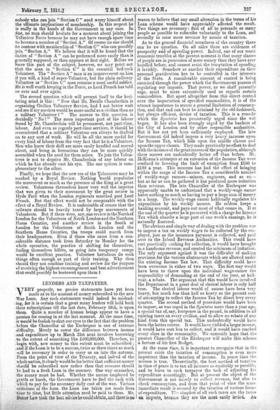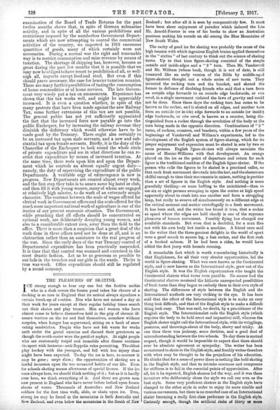LENDERS AND TAXPAYERS.
yERY properly, no precise statements have yet been V made ZS to the amount of money subscribed to the new War Loan. Any such statements would indeed be mislead- ing, for it is certain that a great many lenders will hold back their subscriptions till the last date, February lfith, is upon them. Quite .:a. number of human beings appear to have • a • paeaion for coming in at the last moment. At the same time,. .A would be foolish to shut our eyes to the fact that the problem befere the Chancellor of the Exchequer is one of extreme :diffietilty. Merely to cover the difference between income anal expenditure up to March 31st next involves borrowing to the extent of something like £400,000,000. Therefore, to :begin with, new money to this extent must be subscribed ; band if the Loan is to be a success, twice or three times as much sv ill be necessary+ in order to carry us on into the autumn. From the point of view of the Treasury, and indeed of the whole nation, it clearly would be far better that sufficient money should be subscribed now rather than that recourse should be had to a fresh Loan in the summer. One way or another, the money must be had. Whether the means employed be _gentle or harsh, the Government have to find the cash with which to pay for the necessary daily cost of the war. Various criticisms of the form the Loan has taken are made from time to time, but little attention need be paid to them. Mr. Bonar Law took the best advice he could obtain, and there is no reason to believe that any small alteration in the terms of his Loan scheme would have appreciably affected the result. Two things are necessary : first of all to persuade as many people as possible to subscribe voluntarily to the Loan, and secondly to raise more revenue by means of taxation.
As to the general financial soundness of the country there can be no question. On all sides there are evidences of prosperity and of spending-power. Indeed, one of our worst economic troubles at the present moment is that many classes of people are in possession of more money than they have over handled before, and cannot resist the temptation of spending it lavishly. Somehow or another their expenditure on their personal gratification has to be controlled in the interests of the State. A considerable amount of control is being exercised through the power which the Government possess of regulating our imports. That power, as we shall presently urge, must be more extensively used as regards certain commodities. But apart altogether from this direct control over the importation of specified commodities, it is of the utmost importance to secure a general limitation of consump- tion, and that end can best be attained by the old-fashioned, but always efficient, device of taxation. This is a remedy which the Spectator has persistently urged since the war began. It has also been strongly urged by the bankers of the City of London and by other responsible authorities. But it has not yet been sufficiently employed.. The late Government did indeed impose a very heavy increase upon the Income Tax, which falls upon the middle classes and upon the upper classes. They made practically no effort to deal with the incomes of the great masses of the population, although these masses are undoubtedly better off than before. Mr. MeKenna's attempts at an extension of the Income Tax were confined to lowering the limit of exemption from £160 to £130 a year. This measure has had the effect of bringing within the range of the Income Tax a considerable number of weekly-wage earners—miners, engineers, and so on— but as far as can be gathered it has produced more irritation than revenue. The late Chancellor of the Exchequer was apparently unable to understand that a weekly-wage earner hates nothing so much as having to pay a large sum of money in a lump. The weekly-wage earner habitually regulates his expenditure by his weekly income. He seldom keeps a. banking account, and pays out most of what comes in. If at the end of the quarter he is presented with a charge for Income Tax which absorbs a large part of one week's earnings, he is naturally flustered. The obvious and simple way of dealing with the problem was to impose a tax on weekly wages to be collected by the em- ployer, just as the insurance payment is collected, and paid over to the Inland Revenue Authorities. This would have cost practically nothing for collection, it would have brought in a handsome revenue, and created the minimum of irritation. The only argument against it was the difficulty of making provision for the various abatements which are allowed under the existing Income Tax law. That difficulty could have been overcome in either of two ways. The first way would have been to throw upon the individual wage-earner the responsibility of demanding at the end of the year, or half- year, a rebate. The argument that this would have involved the lltepartment in a great deal of clerical labour is only half true. The clerical labour would of course have been very heavy, but much less than half as heavy as the present cost of attempting to collect the Income Tax by direct levy every quarter. The second method of procedure would have been to impose, as was urged in the Spectator more than a year ago, a special tax of, say, fourpence in the pound, in addition to all existing taxes on every civilian, and to allow no rebate of any kind from this special tax. This undoubtedly would have been the better course. It would. have yielded a larger income, it would have cost less to collect, and it would have reached every class in the community. We earnestly hope that the present Chancellor of the Exchequer will make this scheme a feature of his first Budget.
At the same time, it is important to recognize that in the present crisis the taxation of consumption is oven more important than the taxation of income. In peace time the reverse is true. Theoretically, the best method of taxation in time of peace is to tax all incomes as equitably as possible, and to leave to each taxpayer the task of adjusting his expenditure accordingly. But at present the object of the Government is not merely to collect revenue, but also to check consumption, and from that point of view the more immediate result is secured by the taxation of various forma of expenditura. Ti' simplest of all such taxes are the taxes on imports, becaue they are the most easily levied. Au
examination of the Board of Trade Returns for the past twelve months shows that, in spite of German submarine activity, and in spite of all the various prohibitions and restrictions imposed by the numberless Government Depart- ments which are now attempting to control the commercial activities of the country, we imported in 1916 enormous quantities of goods, many of which certainly were not necessaries. During a normal war the right and reasonable way is to restrict consumption and raise revenue by means of taxation. The shortage Of shipping has, however, become so great during the past few months that it is possible that we may now be obliged to have resort to prohibition of all, or well- nigh all, imports except food and steel. But even if this should prove necessary, the case for heavier taxation remains. There are many further possibilities of taxing the consumption of home commodities or of home services. The late Govern- ment very wisely put a tax on amusements. Experience has shown that this tax works well, and might be appreciably increased. It is even a question whether, in spite of the many protests that have been made against the new Railway Tax, some further extensions of this tax are not possible. The general public has not yet sufficiently appreciated the fact that the increased fares now payable go into the public Exchequer, for by increasing the railway revenue they diminish the deficiency which would otherwise have to be made good by the Treasury. There ought also certainly to be an increased tax upon male servants, and a new and sub- stantial tax upon female servants. Briefly, it is the duty of the Chancellor of the Exchequer to look round the whole circle of private expenditure and see in what directions he can re- strict that expenditure by means of increased taxation. At the same time, there rests upon him and upon the Depart- ment which ho controls an almost equally urgent duty— namely, the duty of supervising the expenditure of the public Departments. A veritable orgy of extravagance is now in progress. New Departments are created almost every week, and the first step they take is to annex some big hotel or club, and then fill it with young women, many of whom arc engaged at relatively high salaries, to do work of an extremely simple character. The contrast between the scale of wages offered for clerical work in Government offices and the scale offered for the much more important national work of agriculture is one of the ironies of our present economic situation. The Government, while preaching that all efforts should be concentrated on national work, are deliberately decoying young women, and also to a considerable extent men, away from the field to the office. There is more than a suspicion that a great deal of the work done in these offices need not be done at all, and is an obstruction rather than an assistance to the real progress of the war. Since the early days of the war Treasury control of Departmental expenditure has been practically suspended. It is time that that control was resumed and exercised in the most drastic fashion. Let us be as generous as possible to our lads in the trenches and our girls in the wards. Theirs is true war-work. Office expenditure should still be regulated by a sound economy.







































 Previous page
Previous page